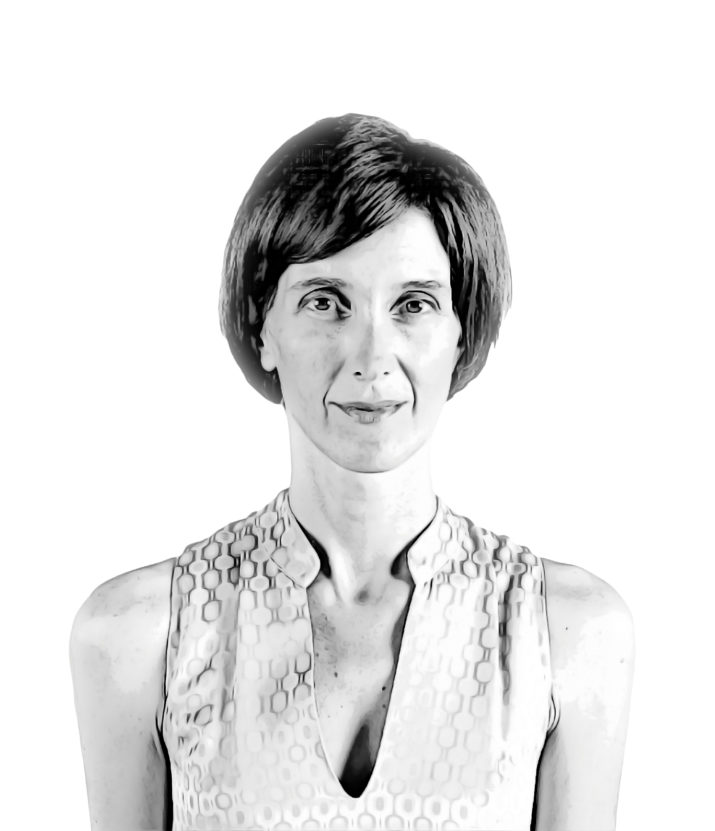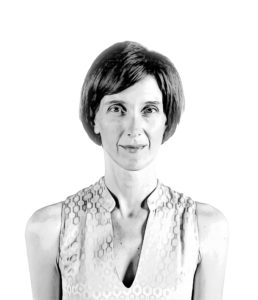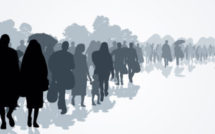

This is part of our special feature on Forced Migration, Displacement, and the Liberal Arts.
I first met Burcu Seyben when she was an undergraduate student, and I faculty member, at Bennington College. Many years later, we were in touch with the International Scholar Rescue Fund because we were concerned about scholars who were being persecuted around the world and wanted to help. Bennington College has a long history of assisting scholars during times of persecution, having brought over Karl Polanyi during the World War II years, where he wrote The Great Transformation while in residence. It turned out that Seyben was under great stress due to the increased arrests and imprisonment of scholars in Turkey. She was teaching at Istanbul Bilgi University, working in the Arts and Cultural Management Department, mostly teaching courses in theater histories, theater studies, theater management, and policies. Seyben also taught playwriting at the Istanbul University. Since 2012, she had been working as an actress and drama teacher in an Istanbul-based theatre company, Mekan Arti and acted in a feature film called Serial Cook directed by a renowned Turkish director, Umit Unal.
We were so pleased that we could help Burcu and her family escape this danger and teach at Bennington College these many years later. Last term, we teamed up to offer a film series, called “Water Dialogues,” that featured a weekend of international films that addressed the problems over clean water that we are all facing in our era of climate change. Participating in the Consortium on Forced Migration, Displacement and Education with Vassar College, Bard College, Bard College Berlin, and Sarah Lawrence College, we are committed to supporting scholars at risk from around the world and creating solidarity with them for academic freedom.
—Susan Sgorbati for EuropeNow
EuropeNow Why did you decide that you needed to leave Turkey? I know you had been there teaching full time at Istanbul Bilgi University and building your career in theatre. What made you leave at this time?
Burcu Seyben I was being persecuted because of signing a peace petition entitled “We will not be a party to this crime,” along with initially a little over 1,100 and later approximately 2,000 academics. In the last decade, Turkey has been doing reasonably well with the Kurdish situation in Turkey. Because of Turkey’s accession to the European Union, there was a relative improvement in the linguistic and cultural rights of the Kurds. The government took official steps to start the Peace Process with the Kurds, correctly, the Kurdish Worker’s Party (PKK) that would bring an end to the decades-long armed conflict between the Turkish army and the PKK. But when the pro-Kurdish political parties and parliament members started to appeal to the younger generation of voters in Turkey and they refused to say yes to the presidential system, for which the then Prime Minister Tayyip Erdogan was trying to change the constitution, the course of things changed.
Additionally, there has always been a resistance among the Turks to accept the Kurds and other minorities as citizens with equal rights. In 2015, the ceasefire between the Turkish army and the PKK ended after several bombings in peaceful rallies. The PKK responded with fire because of the death of many innocent people. In the summer of 2015, some of the Kurdish cities declared self-governance. The Turkish Army retaliated brutally with arms taking these cities and towns under siege and cutting off their communication with the world. Approximately 300 civilians, mostly children, women, and elderly people were killed. No one was allowed to enter these cities and towns and write or say something about the atrocities. The only thing that I could do was to sign the peace petition, which asked the Turkish government to stop the siege in these towns, investigate the civilian deaths, and prevent further ones. From then on, along with the other 1,127 academics who initially signed the document, I was called to the police station, interrogated, and I was about to go to the court. But I left.
EuropeNow So given that it sounded like you responded to these conditions that were going on in Turkey, resulting in danger to you and your family, what does it feel like now that you’re here in Vermont working in a different country? What’s that experience been like for you and your family? What has the adjustment been like for you to be in a different country having to adapt to another American institution?
Burcu Seyben When I went back to Turkey after graduating from Bennington College, I really believed that the country was changing for the better. Everybody around me believed in this change too. Most of my friends or colleagues who have had their education in Europe, the US or other parts of the world, came back to Turkey and really invested in the development of higher education, the political institutions, and the arts. The universities became politically active in terms of advocating for democracy and freedom of speech. However, from 2012 onwards, with the mine accidents, the new laws on abortion, the ban on the use of alcohol in public spaces, and the police brutality during the peaceful protests against the government’s neoliberal policies, in short, the government’s increasing fascism, caused the Gezi uprising in the summer of 2013. The Gezi uprising was a turning point after which the democracy disintegrated really fast. The ending of the Peace Process with the Kurds accelerated the downfall of democracy, if not ended it. For approximately two decades, I had witnessed higher education and democracy bloom, but it took so much less time to abolish it altogether.
In certain ways, the Kurdish situation is worse than it was when we signed the petition. Turkey has even attacked the Kurdish cities in Syria. We, as academics, who defended peace, are saved somehow, but the Kurds are not. And it is almost impossible to say or do anything about the Kurds because the advocates of the peace are either dismissed from their jobs, exiled, or imprisoned.
All of this, and not being able to do anything about it, makes me very unhappy. However, I don’t want to complain about my situation because I was among the lucky ones. The Scholar Rescue Fund immediately acted and provided me a fellowship to come to my alma mater, Bennington College. I feel at home here. Being and teaching among people who taught me, like yourself, and still being able to do research, write, and share academic experiences freely, are privileges that most of my colleagues in Turkey do not have anymore. I’m going to try to do as much as I can from here trying to make people more aware of the situation, not just ours, but the Kurdish case as well. So those are the things that I try to do now. And in terms of adjustment, it was difficult because we had to leave Turkey very quickly. And although I’ve been at Bennington before, it was different because I wasn’t only trying to adjust individually but as a family. But everyone here made us feel at home. I don’t think I could have been more fortunate in one of the most challenging experiences of our lives.
EuropeNow It sounds like you’re saying the Scholar Rescue Fund is how you were able to come over. Could you speak a little about what your experience was like with their program? Have you met other scholars that have been helped by that program as well?
Burcu Seyben The Institute of International Education Scholar Rescue Fund (IIE-SRF), the Scholars at Risk, the Philip Schwartz Foundation in Germany are the primary organizations that help scholars under risk, and they work very closely with each other. So, the first fund that I applied to (because I was in Germany on a tour of a play when the police called me for interrogation), was the Phillip Schwartz, but its deadline was already past. When I went back to Turkey, I wrote them and they sent me contacts of other organizations. The Scholar Rescue Fund immediately responded, and they asked for the necessary documents, and there was a selection process. But everything worked quite fast.
These funds help academics whose lives were under risks, such as academics from Yemen or Syria. Some of these funds get in touch with the academics who are under threat even before these academics ask for help and they try their best to help them. Not only do they enable academics to continue their teaching and research without interruption, but they save people under high risk.
EuropeNow I was wondering about academics from Syria as well.
Burcu Seyben Like with Syria, they first come to Turkey and then from Turkey go to other places.
EuropeNow I was wondering about Yemen right now—given how dangerous the situation is there—whether there are scholars there now trying to get out.
Burcu Seyben I went to Scholar Rescue Fund’s convening last year, and I met many threatened scholars, some of whom had been imprisoned or tortured. The work these funds do not only save the academy, but it also saves lives.
EuropeNow Having gone to this convening where a lot of other scholars are, what responsibility does higher education have in responding to the refugee crisis or reaching out and providing more opportunities for people who are having to flee their countries and find others, you know, even if they’re temporary or permanent situations?
Burcu Seyben Higher education can do a lot of things. One of those things is being aware of the current global situation because due to the wars, the decline of democracies, and the rise of fascism, higher education is in crisis across the globe. Institutions like the Scholar Rescue Fund and Scholars at Risk that are trying to build sustainable programs to host these scholars are critical.
Attending the Scholar Rescue Fund convening, I learned that some of the alumni of the Scholar Rescue Fund, although they can’t go back, have established programs where they are offering online courses. The academics and the students whose teaching or education has been interrupted due to the wars in their home countries are the beneficiaries. It’s also imperative to consider and develop programs to help the academics who can’t work in their countries but who can’t leave the country for various reasons.
EuropeNow How many colleges and universities support a scholar from somewhere else in the world? Because if you think of all the different colleges and universities in the United States, even if every single one were to bring over a scholar, that would be a lot of scholars that they could support, and I was wondering if you know how many colleges and universities participate in these organizations?
Burcu Seyben Not specifically, but there are quite a lot, and some are more active than others. For example, The New School has just established The New University in Exile Consortium in collaboration with other universities. The Academy in Exile has been founded in Berlin. There are many universities in Europe, the US, but also the Middle East that host exiled academics.
EuropeNow That’s very interesting. Our Consortium on Forced Migration, Displacement and Education including Bennington College, Vassar, Bard, and Sarah Lawrence will definitely learn more about these programs and what we can do. What is your biggest concern right now? Given that you have experienced something that many of us have not experienced, and that now you have a certain kind of perspective when you look out now at the global challenges, what are the kinds of things that you think about or read about? Clearly, your connection to Turkey you are following but are there other issues that concern you?
Burcu Seyben One thing that’s very concerning right now is the rise of the far right throughout the world. Other problems such as fierce capitalism, racism, and ultra-nationalism are connected to this as well. We see the repercussions of this in countries like Turkey, which is a third world country trying to cope with a dictatorship. I don’t know how much further this can go. But I don’t think the rise of the far right will stop in the very near future. I am hoping that people will become more aware that this is not only destroying people but nature, resources, water, everything. The oppression against the Kurds is a worrisome example. Not only does the Turkish army systematically kill the Kurdish people, but also destroys their cultural heritage, forests, mountains, and water resources.
EuropeNow With all of these serious issues you have brought up, do you have hope? What sustains you and what do you see is possible to work towards?
Burcu Seyben Well, I have hope. The reason why I have hope is that I always know that there are people who are in worse situations than we are in. I don’t like to pity myself that much. Sometimes when starting to lose hope, I think about the Kurds and how long they have been fighting for their freedom and basic human rights. If they still have hope and believe that they will be free one day, speak their own languages and have equal rights with all the other citizens in their host countries, then why should I lose my hope?
From the moment I signed the petition, everything became highly politicized for me. I don’t think it is possible for me to look at anything, theatre history, theatre theory, the arts, and life in general without thinking about the political context. Taking action and activism have become the primary drive or the core of my teaching philosophy and writing. From here on, I will pursue the role and impact of the arts and education in changing societies.
EuropeNow And so speaking of future generations, this is my last question, what’s it been like for you to come here and teach? I know you were teaching college students in Turkey, but what’s it like to be teaching at a college in the United States now? Now, you have a classroom with students who are also trying to figure out their futures and what they’re interested in. What’s that experience been like?
Burcu Seyben Well, I was really afraid because I know that Bennington students are challenging. In Turkey, I was teaching much bigger classes in a larger university. However, coming here, teaching in smaller classes, and continuing to challenge me as a teacher, helped me a lot. It encouraged me to improve myself, but it also gave me a sense of normalcy, meaning I was still doing what I liked doing. Additionally, it may sound like a cliché, but I feel that now more than ever, I have a mission to talk about what’s going on around the around the world but especially in the region that I know best—the Middle East—through the subjects I know best, theatre and cinema. I try to both understand these myself but also think collectively with the students about the conflicts. And it’s been constructive for me, I mean, in the courses that I’m teaching here, to listen to the ideas of the students who bring in wonderful papers and creative work with strong arguments about the current issues in the Middle East, and the world. This all gives me hope.
I am quite aware that now the students are more aware of the world and themselves as a part of the world. They are critical thinkers ready to tackle major global problems of today and tomorrow. I might have been more naïve when I graduated from college. Maybe the world wasn’t such a bad place. Today the students are more aware and equipped with tools for solutions. So that’s what’s giving me a lot of motivation to write, think, and teach.
Burcu Seyben is a theatre theorist, playwright, actress, and author of Theatre and Multimedia (Habitus, 2016). She specializes in contemporary European and Turkish performances and directors as well as theatre and politics.
Susan Sgorbati, the director of the Elizabeth Coleman Center for the Advancement of Public Action, is a professional mediator and educator whose creative research has led to collaboration across disciplines ranging from dance improvisation to biology to visual arts, as both an artist and a driver of social change.
Published on March 5, 2019.




